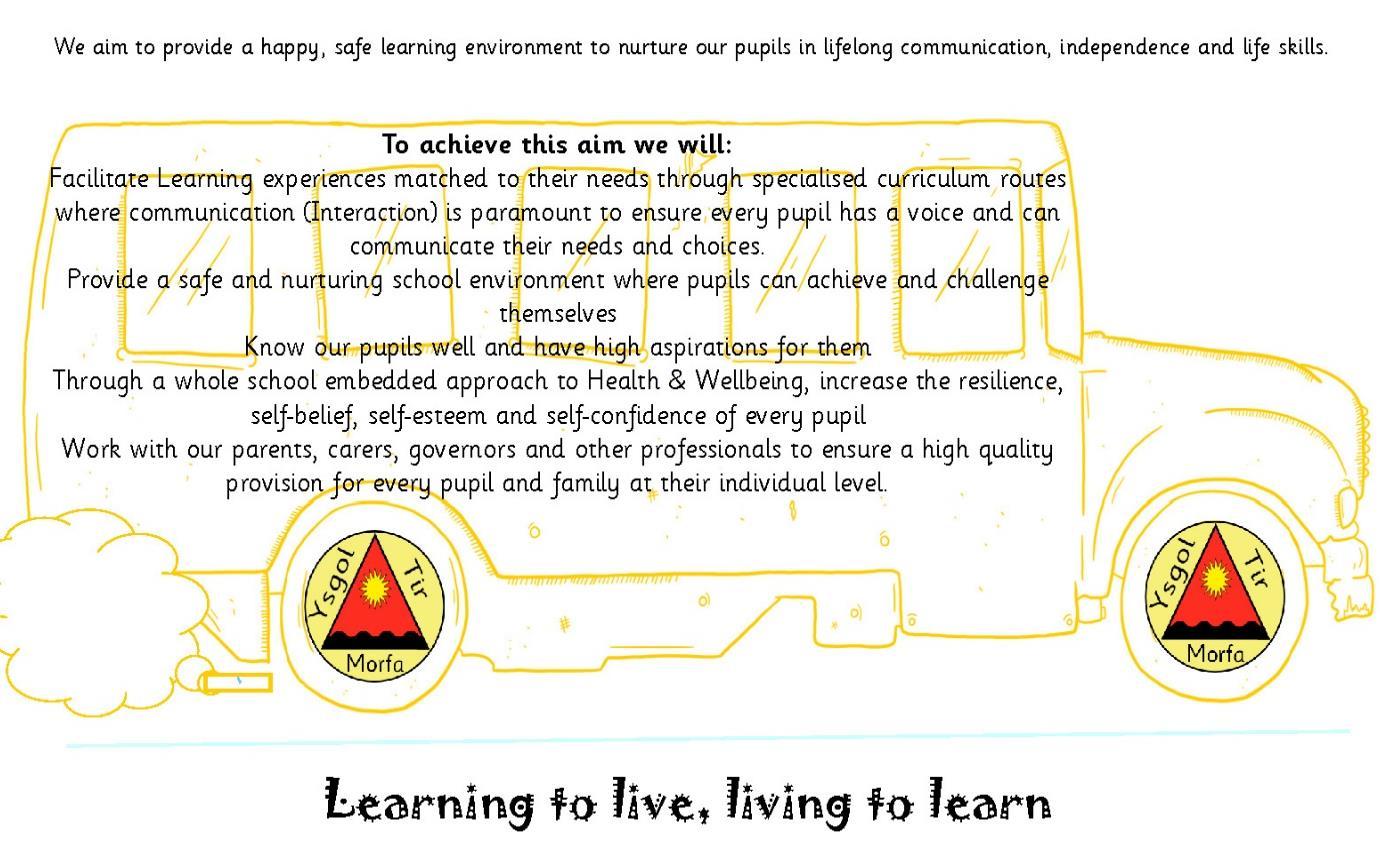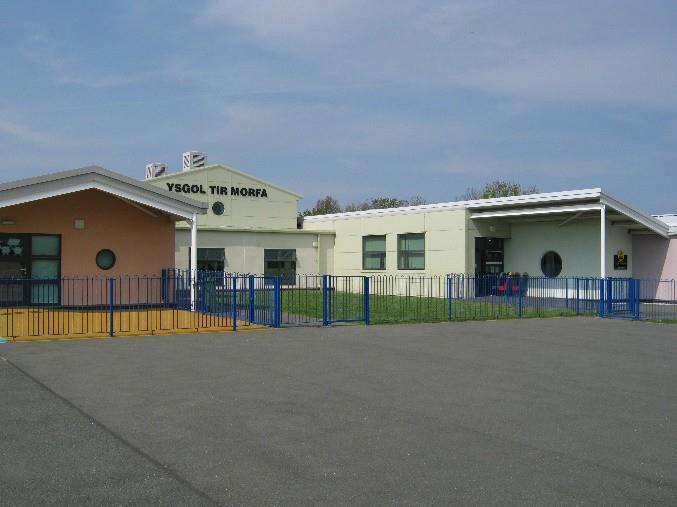The Pupils School Uniform
The wearing of a uniform and a tidy general appearance of pupils promotes a sense of belonging in the school community and reflects our desire for high standards. Primary aged pupils are encouraged to wear the agreed uniform and secondary pupils in years 7 11 are required to wear it on a daily basis. Inevitably over time, items of uniform sometimes go missing it is most helpful if parents mark them with their child’s name. Post 16 learners are not asked to wear school uniform, but should wear clothes that are appropriate for a school setting and suitable for their planned activities each day.
Additionally, fashion belts, make up and jewellery are not allowed, apart from one metal stud earing per earlobe.
School uniform can be ordered from Tesco Online and 1st Class Clothes, Prestatyn.
Pupil Voice
A council consisting of representatives from classes across school meet on a regular basis, to discuss issues and make suggestions for school improvement.
Promoting Good Behaviour
It is important that pupils learn appropriate behaviour and that they are aware of the effect that their behaviour has on others. In order for our school to be a community where learners are safe, happy and able to learn we have agreed expectations for behaviour and a code of conduct.
We expect all pupils to:
• move in an orderly manner around school
• respect and be polite to each other, to staff and to visitors
• adhere to expectations about uniform and appearance
Page | 5
Admissions
rules about mobile phones
Our School Rules are READY, RESPECTFUL and SAFE
Improving pupils’ self image and confidence is the guiding principle for all members of staff in our efforts to promote good behaviour. The school has adopted the Assertive Discipline model and Pivotal approach which reinforces our behaviour management strategy and policy.
A few pupils require individually tailored behaviour plans in order to best support them to behave positively and engage fully in school life. These plans are informed by behaviour analysis and are devised by the class teacher and senior leadership team.
Behaviour Plans (IBPs) encourage pupils to take responsibility for their own behaviour. Individual Reactive Strategies (IRSs) ensure a consistent approach by all staff.
Parents are consulted at an early stage if there are concerns llys fregarding a pupil’s behaviour and we encourage parents to contact the school should they be worried about their child’s behaviour at home.
If you feel that your child has a problem with any issue relating to behaviour you are urged to contact school as soon as possible so that appropriate action can be taken.
Exclusions are extremely rare and are only implemented by the Headteacher after a range of other interventions have been tried. Full consultation with parents would take place if the exclusion procedures need to be implemented.
Bullying
Every learner has the right to learn, free from the fear of bullying, whatever form that bullying may take. Everyone at Ysgol Tir Morfa will work together to ensure that this is the case. As a school we will take an active approach to tackle all forms of bullying and will take action to prevent bullying behaviour as well as responding to incidents if and when they occur.
Our Curriculum
We aim to provide meaningful and relevant learning experiences based on the Curriculum for Wales whilst recognising the specific needs of our pupils.
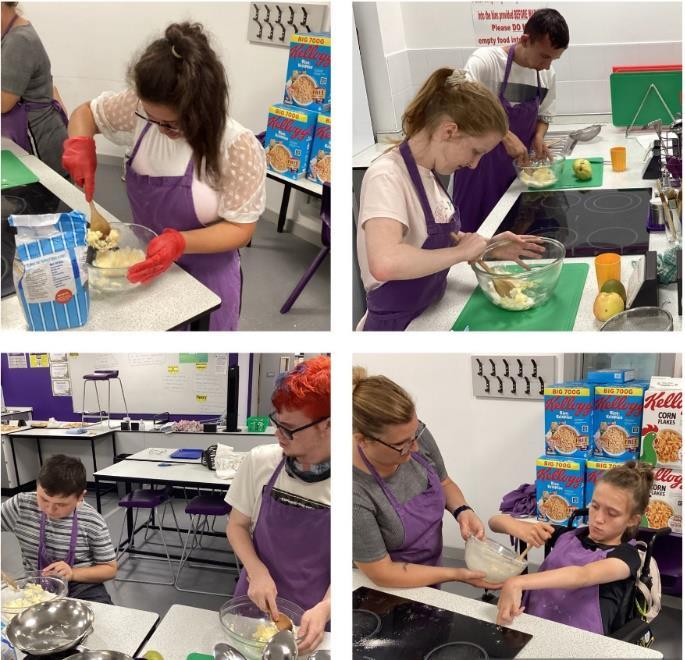
Beyond Early Years provision there are three distinct learning routes through Ysgol Tir Morfa; Explorational, Functional and Supported.
Explorational Route provides for pupils working at the sensory motor stage of child development exploring their world through the senses and motor activities. Learners following the Explorational Route will typically leave school with their developmental journey recognised via the WJEC Entry Pathways Certificate or Diploma in Personal Progress.
Functional Route provides for pupils working at the pre operational stage of child development starting to make sense of the world, do not yet understand concrete logic, cannot mentally manipulate information, and
Page | 6 •
follow
are egocentric. Post 16 provision within the Functional Route allows pupils to develop their independence and life skills out in the community in real life environments.
Learners following the Functional Route will typically leave school with their developmental journey recognised via the WJEC Entry Pathways Certificate or Diploma in Personal Progress and the ASDAN Towards Independence Course.
Supported Route provides for pupils working at the concrete operational stage of child development beginning to think logically about concrete events, but still have difficulty understanding abstract or hypothetical concepts. Learners following the Supported Route will typically leave school having achieved accreditation in a range of WJEC Entry Pathways courses, Duke of Edinburgh Bronze/Silver Award, Prince’s Trust Achieve Award in Personal Development and Employability and , if they stay on for YTM 6th provision, WJEC Essential Skills qualifications in Communication and Application of Number, BTEC Level 1 Sweet Certificate in Personal Growth and Wellbeing, and BTEC Level 1 Certificates in Digital Media and Hospitality and Catering.
Early Years provision comprises (typically) pupils of Nursery age to Year 2 who may ultimately follow any of our three curriculum routes dependent upon their needs upon reaching age seven (Year 3)
Provision is centred on the six areas of learning and experience. Pupil Progress is assessed via Routes for Learning and Foundation Phase Profile as well as Individual learning journals.
Four Core Purposes
The Curriculum for Wales four core purposes are at the heart of our curriculum. Each class have created maps which exemplify activities which promote the four core purposes, as in the example below.
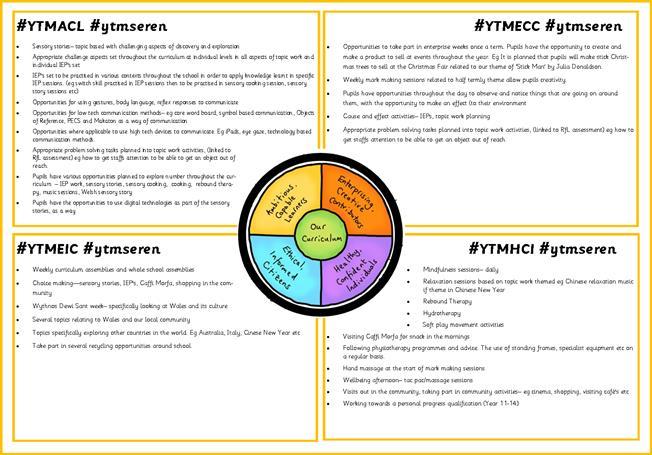
Teaching
At Ysgol Tir Morfa we aim to provide a high quality learning environment based on excellent teaching which supports and inspires our learners to achieve their full potential. Our teaching is based on our understanding and knowledge of the individual needs and aspirations of our learners. All learners will have individual programmes related to their specific needs. A proportion of our learners will follow highly individualised programmes with input from a number of outside agencies. Opportunities to develop skills whilst exploring the
Page | 7
local and extended communities of North Wales will be utilised as appropriate as we seek to prepare learners for their next steps after school, which can include moving on to local FE colleges, residential and day specialist colleges, care services, supported work placements, supported living, training schemes and full employment.
We constantly reflect upon, share and develop our teaching practices, based on our understanding of the 12 pedagogical principles set out in the Curriculum Framework and the practices we find to be successful in our school, specific to the needs of our learners.
The Principles are set our below.
Good teaching and learning:
1. Focuses on the 4 purposes of the curriculum.
2. Challenges pupils to sustain their efforts to reach high but achievable targets.
3. Employs a broad repertoire of teaching approaches.
4. Promotes problem solving, creative and critical thinking.
5. Builds on previous knowledge and experience and engages pupils’ interest.
6. Creates authentic contexts for learning.
7. Employs assessment for learning principles.
8. Makes connections within and across Areas of Learning and Experience.
9. Reinforces Cross curriculum responsibilities including literacy, numeracy and digital competence.
10. Encourages pupils to take ownership of their own learning.
11. Supports social and emotional development and positive relationships.
12. Encourages collaboration.
Planning
Planning at Ysgol Tir Morfa is based on providing our learners with holistic, engaging, broad and relevant learning experiences. Teachers plan on a half termly topic driven basis, ensuring coverage of the six areas of learning and experience using the topic web format shown below.
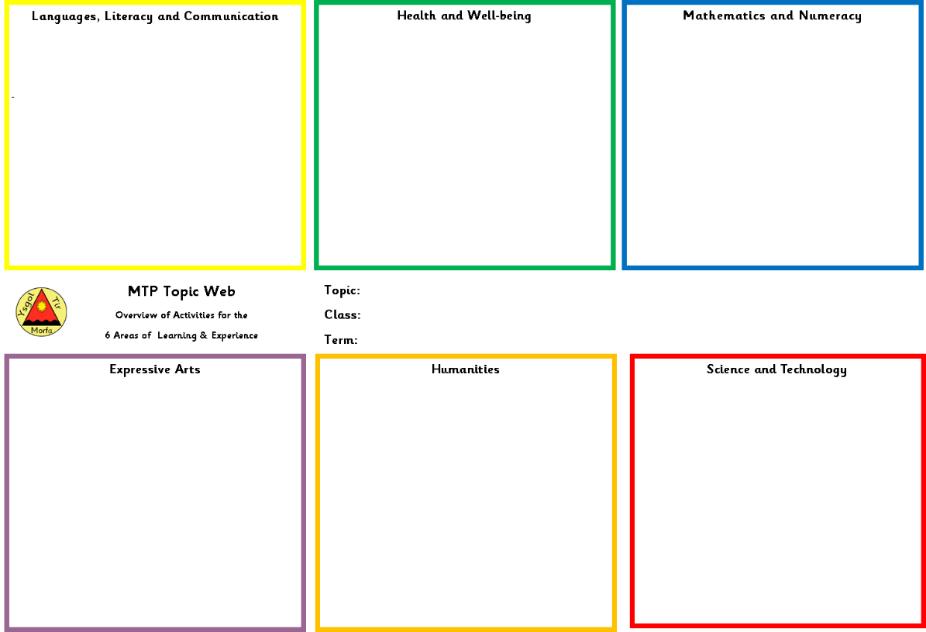
Cross Curricular Skills
Teachers will plan for the development of the following cross curricular skills within and across the Areas of
Page | 8
Learning and Experience using the revised national frameworks:
• Literacy
• Numeracy
• Digital Competence
Cross cutting themes
The five cross cutting themes identified below will also be planned for and delivered across the curriculum. Weekly assemblies will also address these themes.
1. Relationships and Sexuality Education (Discrete sessions with teachers and other professionals will also be delivered)
2. Human Rights education and the United Nations Convention on the Rights of the Child (UNCRC
3. Diversity
4. Careers and work related experience
5. Local, National and International Context
We also plan (where appropriate) to ensure that our provision and teaching develops the integral skills below, which are essential for our learners to achieve the 4 purposes.
Creativity and Innovation
Enquire, explore, be curious, create and share ideas. Link experiences, knowledge and skills.
Critical thinking and problem solving Question and evaluate information and situations. Identify problems and suggest solutions. Make decisions objectively.
Personal Effectiveness Develop emotional intelligence, confidence and independence. Evaluate and discuss their current learning and mistakes, identifying areas for development. Reflect on and consider their own views and values, and their ethical, social, cultural and legal implications.
Planning and Organisation Set goals for their learning and discuss and reflect on their progress.
Mandatory elements of the curriculum
Teachers will also plan to secure the mandatory elements of the curriculum when planning. These are:
• Religion, values and ethics
• Relationships and Sexuality Education
• Welsh
• English
Progression
Some of our learners will be operating within the period of learning leading to Progression Step 1 which is referred to as the ‘Enabling Learning’ period. This period is seen as the gateway to the statements of what matters in the six areas of learning and experience (Areas) and the descriptions of learning at Progression step 1. It provides the firm foundation that all learners need to support development, at their own pace, towards realising the four purposes of the curriculum. Within the enabling learning period provision centres on five developmental pathways of:
• belonging
• communication
Page | 9
• exploration
• physical development
• well being
For these learners Routes for Learning documents will be used to plan and monitor for progression. Learning journals are kept to chart pupil progress.
For learners operating within Progression step 1 and above, the ‘What Matters Statements’ for each area of learning and experience will be the basis of our planning for progression, depth and breadth of skills and knowledge and for learner progress. Planning documents will highlight the What Matters Statements coverage (Progression Steps 1 to 3).
What Matters Statements for the 6 Areas of Learning and Experience Languages, Literacy & Communication
Health and Wellbeing Mathematics and Numeracy
Languages connect us Developing physical healthand wellbeing has lifelongbenefits
Thenumbersystemis usedto represent and compare relationshipsbetween numbers and quantities
Expressive Arts Humanities Science and Technology
Exploringthe expressiveartsis essential to developingartistic skills and knowledge andit enables learners to become curiousandcreative individuals
Enquiry, exploration and investigation inspire curiosity about the world, its past, presentandfuture
Being curious and searchingfor answers is essential to understanding andpredicting phenomena
Understanding languagesiskey to understanding the world aroundus
Expressing ourselves through languagesiskeyto communication
Howweprocessand respond to our experiences affectsour mental health and emotional wellbeing
Ourdecision makingimpacts onthequalityofour ownlives and the lives of others
Algebra uses symbol systems to express the structureof mathematical relationships
Geometryfocuseson relationships involvingshape, space and position, and measurement focuses on quantifying phenomenainthe physicalworld
Responding and reflecting, both as artist and audience,isa fundamental part of learningin theexpressivearts
Creating combines skillsand knowledge, drawing onthe senses, inspiration and imagination
Events and human experiences arecomplex,andare perceived, interpreted and represented in differentways
Our natural world is diverse and dynamic, influencedby processes and human actions
Designthinkingand engineering offer technicaland creative ways to meet society’s needsandwants
Designthinkingand engineering offer technicaland creative ways to meet society’s needsandwants
Literature fires imaginationand inspirescreativity
How we engage withsocial influences shapes whoweare, and affects our healthand wellbeing
Healthy relationshipsare fundamental to our wellbeing
Statistics represent data, probability models chance, and both support informed inferences anddecisions
Human societies are complex and diverse, andshapedbyhuman actionsandbeliefs Informed,self awarecitizens engage with the challengesand opportunities that face humanity, and are abletotake consideredandethical action
Matter and the way itbehaves defines our universe and shapesourlives
Forces and energy providea foundation for understanding ouruniverse Computation is the foundation forourdigitalworld
For these pupils progress will be tracked via:
• BSquared Connecting Steps
• Essential Skills Progress Maps
• Life and Work Skills Progress Map
Page | 10
Supported Curriculum
Learners in our Supported Curriculum Route are based at both the Ffordd Derwen site and at our Grange Road site with access to specialist resources as well as additional learning opportunities within Rhyl High School. The Curriculum for Wales and the 4 purposes drives provision for all pupils up to the age of 16 with teachers planning for coverage of the six AOLEs on a half termly topic web. Learners in the supported curriculum route range from age 2 years 6 months up to 19 years old.
At KS4 pupils follow WJEC Entry Pathways courses, Princes Trust Achieve Award in Personal Development and Employability and the Duke of Edinburgh Award. Careers and Work Related Education is a prominent aspect of supported provision with all learners aged 14+ encouraged to attend work experience.
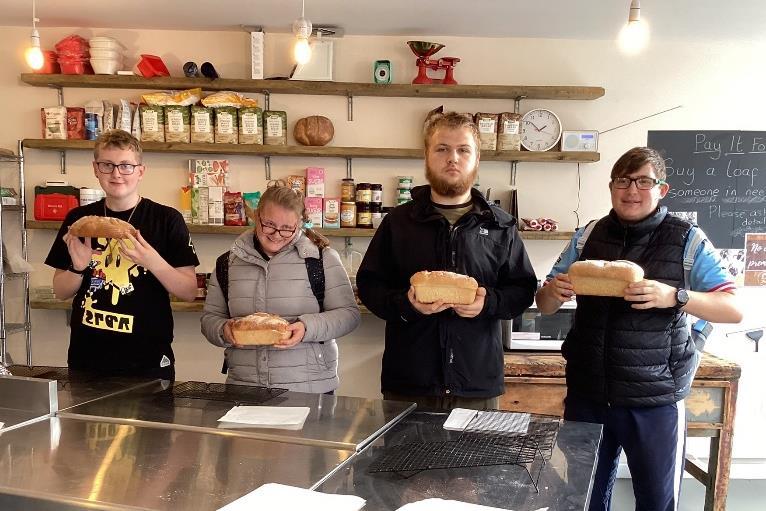
YTM 6th provision includes accreditation in Essential Skills Communication and Application of Number, BTEC introductory qualifications in Digital Media and Hospitality and Tourism and also the BTEC Sweet level 1 qualification in Personal Growth and Wellbeing. In YTM 6th the Princes Trust Qualification is also extended to a Level 1 Diploma.
A learner in the supported curriculum route has the ability to learn with increasing independence given quality care, support and guidance. The pupils in Ysgol Tir Morfa experience the different stages of development such as the Sensory motor stage, Pre operational stage and Concrete operational at differing ages, and move through these stages at various paces. An older Supported Curriculum learner can work on their own and as part of a team. They are gaining the skills to cooperate and negotiate; displaying empathy and an understanding of equality. A learner in the supported curriculum will access a modified national curriculum, creatively presented, which targets basic skills in a variety of contexts. Health and Wellbeing provision is integral to the supported curriculum with a focus on emotional literacy including breakfast , ‘Cwtch’ a timetabled nurture provision staffed by a trained trauma informed, emotionally availably adult and a variety of outside learning opportunities. The supported curriculum route provides the learner with opportunities every day to enjoy active learning, achieve their potential, believe in themselves and express themselves whilst preparing them for independent living, further educational opportunities and employment.
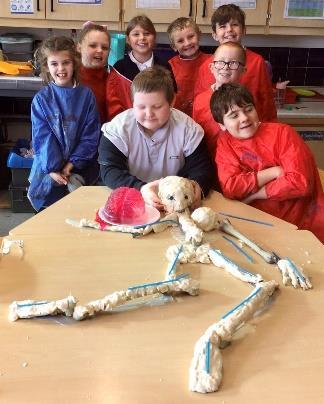
Explorational Curriculum
Pupils accessing the Explorational Curriculum at Ysgol Tir Morfa will be at the sensory motor stage of development with an approximate developmental age between birth and two years. Pupils at this stage of development need a multi sensory approach to learning, enabling pupils opportunities to explore and experience the world around them. Pupils in the Explorational Curriculum are described as having profound and multiple learning difficulties (PMLD) and are aged between 3 to 19 years.
Pupils at this developmental stage are working below Progression Step 1 of the Curriculum for Wales therefore have a differentiated curriculum approach. The curriculum for this developmental stage is based upon ‘Enabling Learning’ and the ‘5 Developmental Pathways;’ belonging, communication, exploration, well being and physical development. Our
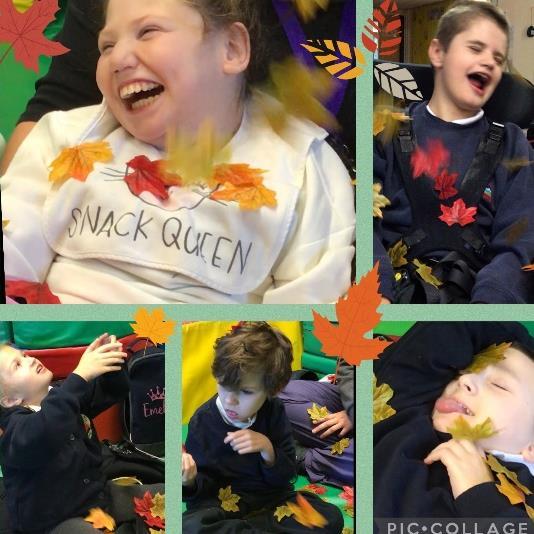
Page | 11
curriculum provides the firm foundations that our learners need to support development, at their own pace, towards realising the four purposes of the curriculum.
The curriculum works on a yearly long term plan which can be adapted on an annual basis with broad overarching themes with a multi sensory approach to learning.
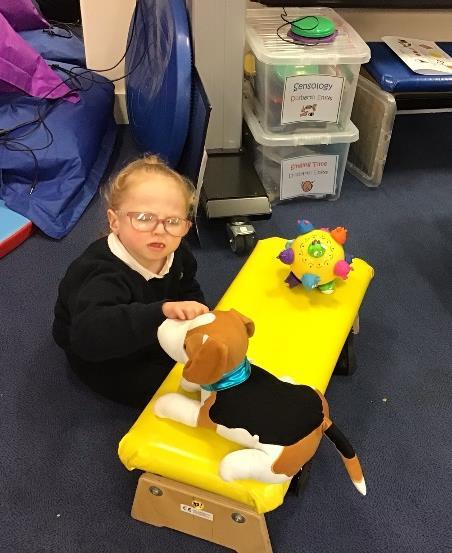
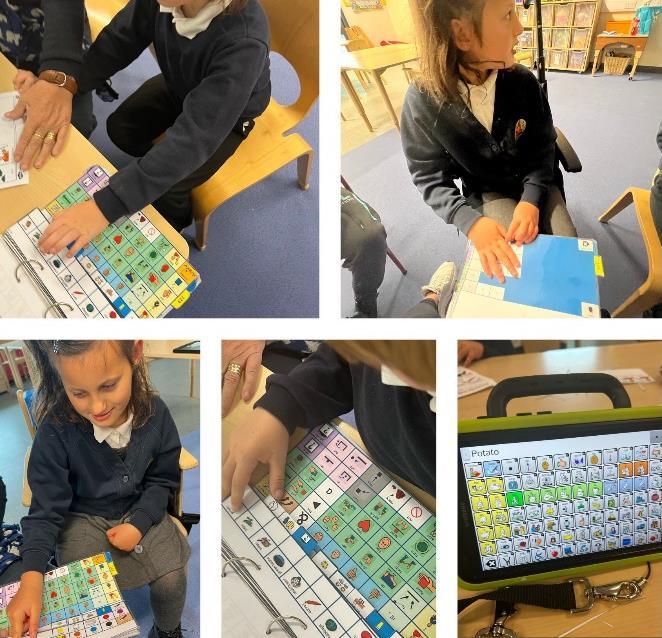
The curriculum is underpinned by the 12 pedagogical principles which ensures good teaching and learning experiences are provided to pupils at their stage of development.
All pupils at this stage of development are working at developing skills on Routes for Learning which are an integral part of the curriculum. All pupils will be working at their own pace and will have their own route map which shows their individual pathways. All planned curriculum themed activities will come back to the development of Routes for Learning in order to develop pupils’ communication, exploration and independence skills.
Pupils may have close involvement with a wider team of professionals including Speech and Language Therapists, Occupational Therapists, Physiotherapists, support from the teacher for visually impaired, and other health professionals. In the Explorational Curriculum we strive to build close working relationships in order to develop and build on specialist advice and incorporate this into pupils’ individual programmes and target setting.
Functional Curriculum
The functional curriculum route is for pupils age 5 16 and has been planned to show and offer progression over a period of time, but also acknowledges that many skills are lost if not practiced and generalised in different contexts. We aim to deliver a broad and balanced curriculum that is adapted to meet the needs of every pupil and to overcome any barriers to learning using a range of specialist interventions.
Following the Curriculum for Wales framework, our learners access a varied and practically led curriculum ensuring learning is brought to life, is engaging and most importantly appropriate to the individual learner. The curriculum promotes the four purposes of learning (ambitious, capable learners, enterprising, creative contributors, ethical, informed citizens, and healthy, confident individuals) and teaching approaches reflect the age and learning style of pupils concerned, consolidated by repetition and reinforcement.
Cross curricular links are consciously embedded throughout all activities across the six areas of learning with an emphasis on communication, appropriate behaviour and independence skills. This route slowly builds on the essential skills our young people will need as they progress in their lives and recognises in equal weight the importance of self help and independence skills alongside the more traditional basic skills.
Learning follows a 2 year topic cycle which comprises half termly topics. This process ensures progression but also embeds learning through necessary repetition which checks progress and real understanding and gives opportunities for generalisation which is crucial for our pupils.
Taking our pupils learning out of school and into their local community is a valuable part of our curriculum. It is vital that the skills pupils are learning in class are experienced parallel to the real life learning experiences so that crucial
Page | 12
links are made between the two.
When our pupils reach KS4, an emphasis on their next step becomes the priority and their transition to our Post 16 department becomes a focus. Pupils will start to access the work experience facilities on site with the opportunities to work alongside current P16 pupils. They also have opportunities to acquire accreditation.
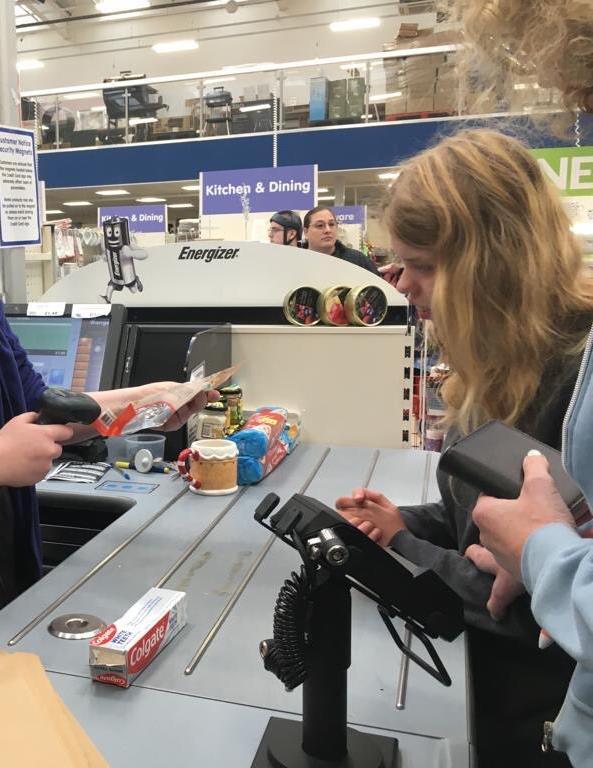
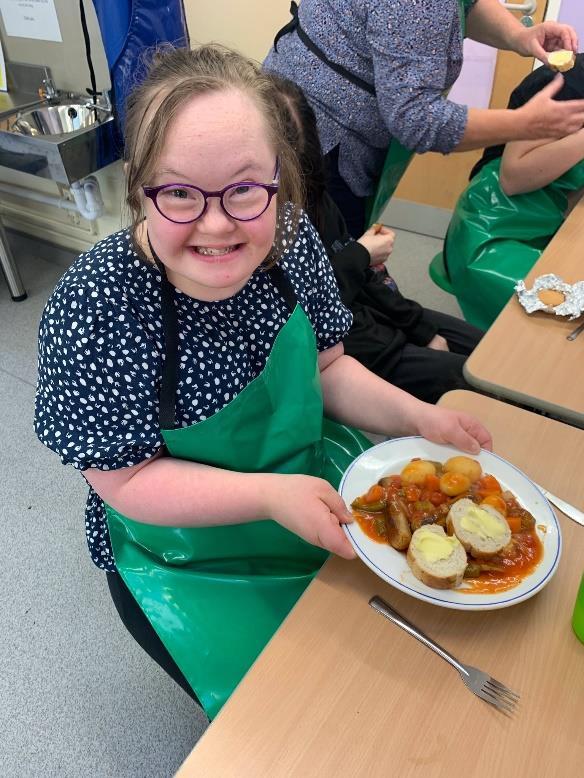
Post 16
The Post 16 department is the bridge between school and college, training or the work place. Our students are given steadily increasing opportunities to develop self reliance and independence at home, in the community and at work. This in turn develops confidence, communication and self esteem, health and wellbeing. We encourage students to behave in a mature manner, consider safety and to take responsibility for making decisions about their futures.
We build on the four purposes of the Curriculum for Wales; preparing each student for their next stage in life; college, supported/independent living and work. Priorities for each student to overcome the main barriers to their next step are discussed with the student and their families. Priorities are targeted with a series of long term and short term personal learning goals. Essential skills with a focus on communication, use of technology to support communication and increase independence, functional writing, reading, money, time, measurement and solving simple number problems are the primary focus in all activities.
The structure of our programme is the ASDAN Towards Independence accreditation. Students work to complete units including Using Transport, Out in the Community, Money, Independent Living, Everyday Living, Horticulture, Environment, Practical Workshop, Personal safety, Using leisure facilities and for some of our students, units in developing sensory communication, multisensory communication and sensory baking. All course units are worked on simultaneously and three units are accredited each year.
Opportunities to develop careers and work related experiences are provided through our school café, floristry shop, charity shop and polytunnel which provide on site supported work experiences which are open to the public. Students also have the opportunity to access off site supported work experiences and possibly off site unsupported opportunities when they are ready. Students are also given opportunities to visit workplaces, access college taster courses and volunteer for community organisations such as Keep Wales Tidy and Nant Clwyd Y Dre Historic garden.
Students are encouraged to make healthy choices that promote well being including choosing healthy snacks, making balanced nutritious meals, personal hygiene, social opportunities, fitness activities including walking, cycling, dance and swimming. Activities that enable us to keep ourselves safe at home and in the community are a focus each week and relationships and sexuality education is essential to prepare our students for a safer, happier future.
Page | 13
Ysgol Tir Morfa is an English medium community. However, as a school in Wales, we promote and celebrate the Welsh Language and Culture. Welsh as a second language is taught to all learners of statutory school age whilst Welsh Language and Culture is promoted throughout the school. The school’s celebration of Welsh culture culminates in an annual Wythnos Dewi Sant and Eisteddfod.
Religious Education and Collective Worship
Religious Education is taught in order that pupils have the opportunity to learn about the world in which they live and about the values of the people who inhabit it. Religious Education is taught in specific lessons and also through a more integrated approach or within a theme. The aim is to develop spirituality in the pupils and to encourage them to find strength of character to face the varying circumstances of life. Meeting together to share and express what is worthwhile and valued in our school and in the world is an important part of the curriculum at Ysgol Tir Morfa celebrating pupils’ achievements, birthdays, saying ‘goodbye’ are but a few examples. The whole school gathers together once a week to celebrate the week’s achievements. On the other occasions assemblies take place in class or curriculum groups. Whilst we hope that every child will take part in these aspects of school life, parents have the right to withdraw their child from acts of worship, religious instruction or elements of it if it is their wish. In this case, parents should consult the Headteacher and alternative arrangements will be made to accommodate their child during these sessions
Sex and Relationships Education
Sex and Relationships Education is included in the curriculum on an annual basis as a unit within Personal and Social Education. The provision aims to support pupils through their physical, emotional and moral development. Delivery of this aspect of the curriculum is in a progressive, carefully planned, sensitive manner, appropriate to the age and learning needs of the pupils. The school has a Sex and Relationships (SRE) Policy which includes an overview of the content covered. This policy has been approved by the Governing Body and parents can request a copy of it. Parents have the right to withdraw their child from some aspects of SRE we ask that they notify the Headteacher in writing with this request.
Accreditation in Years 10 & 11
Learners aged 14 16 years follow a range of courses accredited via the WJEC including Entry Pathways qualifications. Accreditation of the wider key skills is also available through the Prince’s Trust Achieve Programme and the Duke of Edinburgh Award.
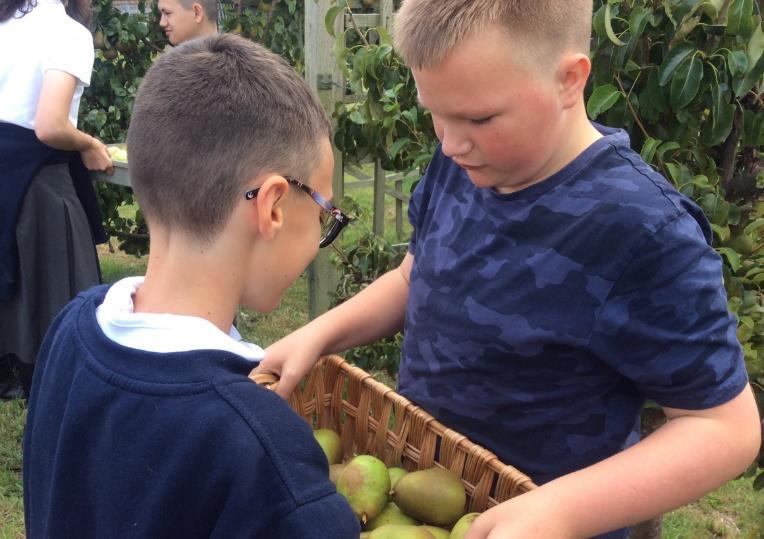
The Post 16 Curriculum offers experiential learning in practical, real life situations. Learners are given opportunities to develop the skills and personal qualities needed for their next steps college, training or work, and supported or independent living. The three routes followed up to school year 11 are reflected in our Post 16 provision.
A range of accreditation and awards are followed by Post 16 learners, including:
• ASDAN Towards Independence Award
• ASDAN Employability Qualification Entry level 2 3
Page | 14 Welsh Second Language
hygiene and LANTRA land based employment qualifications
A wide range of specialist interventions and individual programmes are used by staff to address the individual needs of learners. These include Hydrotherapy, Rebound Therapy, Music Therapy, Sensory Breaks, SAFMEDS, Language for Thinking, PECS, Makaton, AAC, Objects of Reference, Interactive Home/School Diaries (SeeSaw), Headsprout Reading Intervention, Catch Up Literacy.
Careers Education and Guidance and the World of Work
We work closely with Careers Wales and other partners to support pupils in preparing for their next step, be that education (at local or specialist colleges), employment or training.
All learners aged 14 19 access a comprehensive World of Work programme which includes on and off site work experience; college link courses and individual career planning with Careers Wales. Our vocational options programme enables pupils to choose from a range of on and off site activities including Landscaping and Grounds Maintenance; Woodland Crafts; Floristry and Creative Crafts; Catering; Cycle Maintenance.
Communication Systems
A variety of systems are used throughout the school in order to support our pupils’ means of communication. Signs, symbols, photographs and objects of reference are an essential part of the day to day language and communication which take place at Ysgol Tir Morfa. The following systems are regularly used:
Body language, facial expression, eye pointing, fine and gross motor movement, speech verbal expression , personal vocalisations and gestures, objects of reference, Makaton, photographs, Picture Exchange Communication Symbols, electronic aids (AAC devices) and development of personal communication passports.
Homework
At Ysgol Tir Morfa home learning for pupils is available for those parents who wish their son/daughter to undertake additional study at home. Parents who wish to encourage their pupils through home learning are invited to visit school first to discuss the work and approaches used.
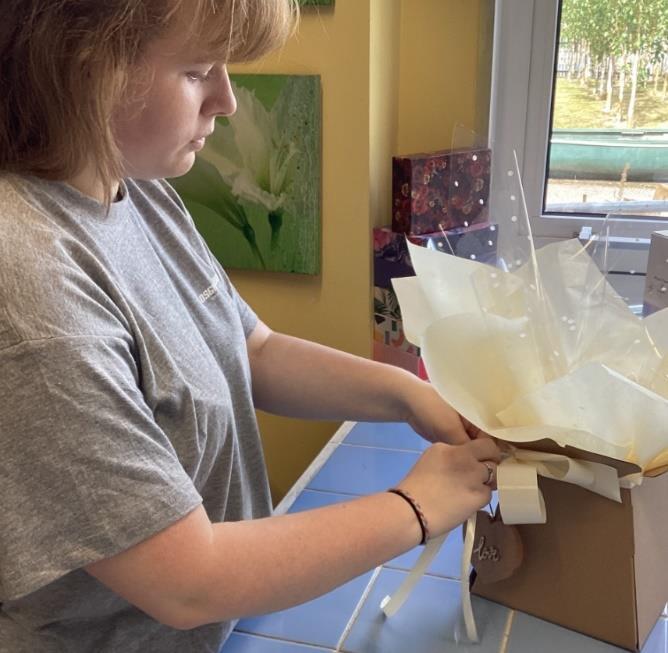
School Sports
Sport, physical education and physical development are seen as a vital part of the learning experience for all pupils at Ysgol Tir Morfa, with the ultimate aim of providing pupils with the skills, knowledge and motivation to continue participation in sport or physical activity into adult life. Pupils follow appropriately challenging programmes based on their needs and ability. The school are active members of the North Wales Special Schools Sports Association, which organises regular competitions and events throughout the year. Activities range from team sports such as Football and Basketball through to events such as ‘Splash and Swim’ for non swimmers, and Ten Pin Bowling. The school have strong links with the local Disability Sports Officer who facilitates in school
Page | 15 • Essential
1 3 •
Skills Wales Qualification Entry level
Food
Extra Curricular Activities
School staff and visiting professionals provide a range of extra curricular activities throughout the year including sports, sensory, music, dance, craft and football club. The school have performed regularly at the Denbighshire Arts Festival and is a Lead Creative School.
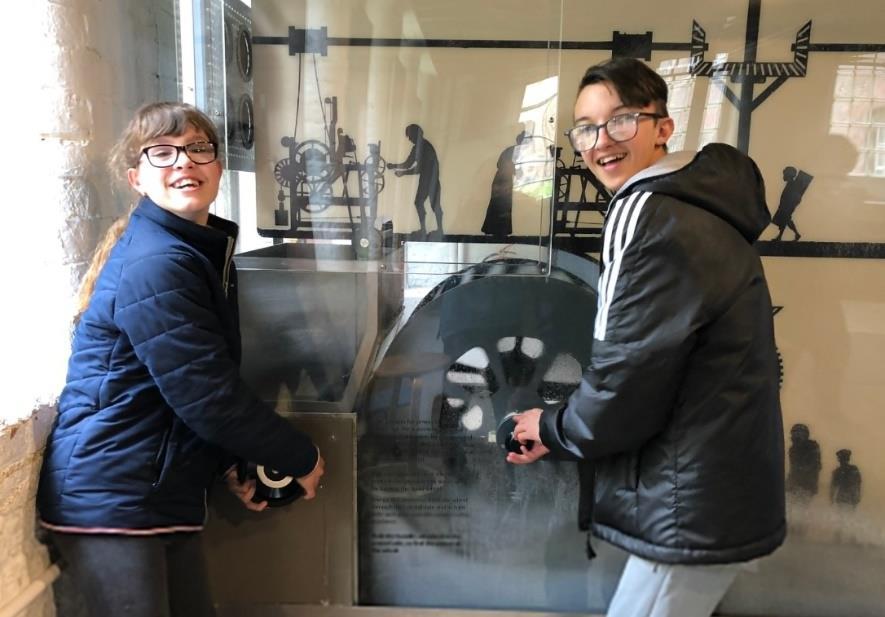
School Visits and Charging Policy
There will be many occasions throughout the school year when educational excursions outside school are arranged and visiting theatre companies etc. come to enthuse, educate and entertain the pupils. These visits are used to re enforce classroom based learning opportunities and also encourage and develop important social skills and build self esteem. We believe they are an invaluable contribution to the promotion of life long learning in our pupils. There are many times when, due to pupil numbers, the school cannot cover the total cost of the trip and parents are asked to make a voluntary contribution of a stated amount of money. The school has its own fund and fund raising events are held in order to subsidise the many different activities.
The cost of excursions includes travel, transport, entrance fees and insurance cover. Details for each visit are sent out to parents in advance of each trip with a consent form for parents to sign to agree to their child’s participation.
All educational visits are planned and carried out according to LA procedures. Prior to each trip teaching staff complete a detailed risk assessment which is agreed and signed by the Headteacher. Residential trips, are approved by the governing body and the local authority.
Assessment, Recording and Reporting
Pupils at Ysgol Tir Morfa are subject to the requirements of Welsh Government statutory requirements set out for all schools. This includes assessments against the Foundation Phase Framework, the National Curriculum and the Literacy and Numeracy Framework. In keeping with these national requirements, records are kept and attainments are reported to parents. It may be appropriate that some pupils sit the National Reading and Numeracy Tests, decisions are made on an individual basis.
Pupils are also assessed against other, non statutory measures in order to inform teaching and learning and track progress.
Page | 16
visits from a range of local sporting bodies, and also provides links to local Disability Sports Clubs.
Our Parents
Working in partnership with parents is of paramount importance. At Ysgol Tir Morfa we value the expertise and knowledge that parents provide about their child that will ultimately ensure we can provide the best learning opportunities for them. We provide a minimum of three formal opportunities in the year to meet with parents two parents’ evenings and an Annual Review meeting. Additionally, we welcome parents’ requests to discuss concerns or issues. Furthermore, in order to maximise the benefits of all learning we provide sessions for parents on communication and learning theories so that they can continue to embed the learning at school in a consistent manner.
E Mail
We ask parents to email the school via the general admin address at post@ysgoltirmorfa.co.uk. All emails will be treated with appropriate confidentiality. Please note all emails should specify the member of staff to whom the query is addressed. In the first instance, this is usually your child’s class teacher. If a response is required, it will be made by the appropriate member of staff.
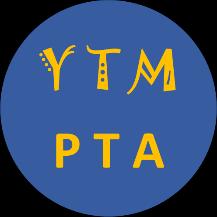
Letter
Letters can be given to your child to give to his or her class teacher, given to the school office or posted. As with emails, letters will be treated with appropriate confidentiality. You are asked to make clear the member of staff to whom the query is addressed. If a response is required, it will be made by the appropriate member of staff.
Telephone
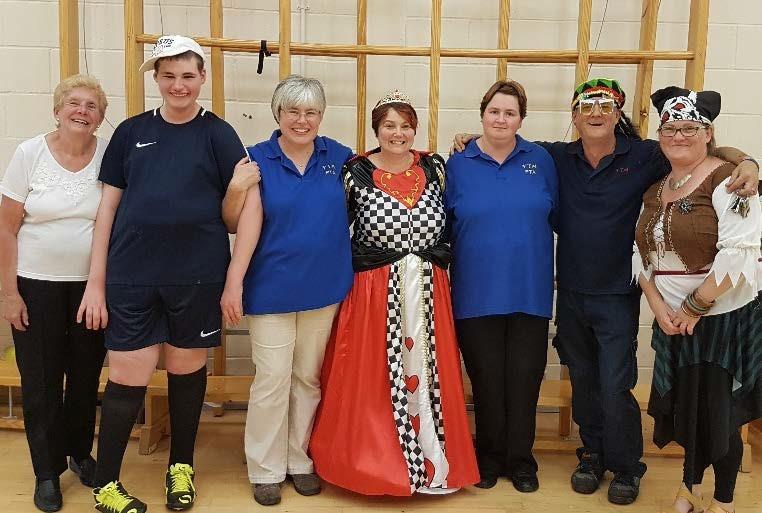
Telephone calls are appropriate to notify us that your child will be absent from school, to communicate brief information about your child that the school needs to know or in an emergency. We ask parents to telephone the school on 01745 350388.
If the school office is closed there is an answering service available to take your message. Members of staff cannot accept telephone calls during the school day. A message may be left with the school’s admin staff in the school office and your call will be returned by the most appropriate person who will endeavour to do so on the same day or as soon as practicable.
SeeSaw / Student Diary
The Diary is used as a key method of communication between parents and the school. This will be used to deal with matters which arise during a normal school week. The diary is not confidential and may be read/seen by all members of staff (teaching and non teaching) in the class. Any matters which parents consider confidential may be communicated by letter marked confidential and addressed to relevant member of staff and enclosed in thediary.
Parents can visit the school to ask questions; gain support or to have the opportunity to talk about issues affecting their child with either his/her class teacher or a member of the school Leadership Team. Parents are asked to make an appointment via the school office to ensure that the appropriate member of staff is available.
Page | 17
Weekly Twitter Highlights
A leaflet of ‘Twitter Highlights’ is compiled from a selection of the previous weeks tweets. It is produced weekly and sent home on SeeSaw and made available on our website. The highlights are a means of sharing some of our tweets and general information including key dates with parents that do not access Twitter.
Twitter
Ysgol Tir Morfa welcomes anyone who is interested in the life of the school to follow us and connect with us on Twitter. Each class has a Twitter hashtag for parents to follow e.g. #ytmbrenig. Follow us @TirMorfa
PLG’s (Personal Learning Goals)
These are updated three times a year and shared with parents for their input and agreement.
Annual Reviews and Annual Reports
These are held annually for each pupil in Ysgol Tir Morfa and offer an opportunity for school, parents and other agencies to discuss the provision for their child. We follow a person centred planning approach in our annual reviews. A full report on attainment and progress is given to parents at the end of the Summer term. Parents are invited to make an appointment to discuss their child’s report with the class teacher if they so wish.
Surveys
We welcome and value feedback from parents and carers about our school’s policies and practices. We conduct surveys to gather views and comments of parents and carers about our school and feed this into school development targets throughout the school year.
Website
The school website can be found at www.ysgoltirmorfa.co.uk
The school website contains all general information about the school including our staff, governors, our aims and vision, news/events and important announcements. Pupils will find links to familiar learning resources and parents will find available to download our termly newsletters, letters sent home and policies. The website is regularly updated.
PTA
The school has an active Parent Teacher Association who organise a variety of fund raising events throughout the year. They work tirelessly to support the work of Ysgol Tir Morfa and always welcome new members.
Please follow our PTA on Twitter @ytmpta or on the PTA page of our school website.
Page | 18
Safeguarding
As a caring school with direct responsibility for pupils, our first concern is the welfare of the child. It is a legal requirement that each school should have a designated safeguarding person; this is our Senior Leadership Team. The school has a legal obligation to contact other agencies where there are child protection concerns. It is the duty of the Governing Body to ensure that the appropriate procedures are in place for the protection of pupils from abuse. All matters concerning child protection issues are dealt with strictly on a need to know basis and are treated with the utmost confidentiality.
The staff of Ysgol Tir Morfa fully recognise the contribution they must make to safeguarding pupils and promoting their welfare. All staff are trained and have a full and active part to play in protecting pupils from harm. We believe that Ysgol Tir Morfa should provide a caring positive, safe and stimulating environment which promotes the social, physical and moral development of the child.
Attendance
Regular attendance is vital for pupils to get the most out of the learning opportunities provided at school. When attendance is causing concern we work closely with parents to give as much support and advice as we can. We have a staged procedure in response to absence which eventually involves a referral to the Educational Social Work service. Hopefully we can resolve issues before reaching this level.
The school follows local authority guidance and the Headteacher will exercise discretion in authorising leave for a family holiday during term time. If an unauthorised holiday is taken, this may result in a Fixed Penalty Notice being served.
We recognise that absence caused by illness is unavoidable and that some of our pupils have significant medical conditions which may affect attendance. If it is necessary to keep your child at home, please telephone school on the first day of absence. We ask that parents avoid medical and dental appointments in school time, but if this is unavoidable, please bring your child to school for the remainder of the day.
School Meals
Nutritionally balanced mid day meals are cooked on the premises. Primary aged pupils receive a set meal, whilst a cafeteria system operates for secondary aged pupils. Parents may provide packed lunches each day if they prefer. Please note that no glass bottles are allowed and we ask you not to include any fizzy drinks. Please consider the contents carefully as there is not a designated refrigerated area for packed lunches.
Currently meals are paid for in advance every Monday morning. Parents will be kept informed of any price rises in school meals so that they may adjust the amount of dinner money they send in with their child. Parents who feel that they may be entitled to free school meals should contact either the school or the county Free School Meals Section to obtain an application form, which should be completed and returned to school or County Hall.
School Nurse and Medical Issues
The school currently benefits from the provision of a full time trained school based Paediatric Nurse. Reporting to the Headteacher, she oversees the medical needs of those pupils requiring specific health care plans. The plans detail the arrangements and procedures to be followed and must be agreed by parents, the Headteacher and the Paediatric Nurse.
The Paediatric Nurse oversees the day to day work of Health Care Support Workers who are deployed to meet the needs of a small number of pupils with complex health needs. She also provides advice, support and training to school staff and parents.
Page | 19 Pupil
Welfare
Opportunities are provided for pupils to have a regular medical examination in school. Parents are invited to be present so that any problems or worries which they have concerning their child’s health may be discussed with the doctor and nurse.
It is very important that the school is made aware of any medical conditions which your child has. When a pupil requires medication temporarily we would ask that wherever possible the medication should be administered at home. If it becomes necessary to administer medication during the school day you should contact the school to discuss this with the Paediatric Nurse. Please note that we require written permission to administer any form of medication in school. Medication should be sent into school in its original packaging, as dispensed by the pharmacy. It must be labelled with the prescriber’s instructions including pupil’s name, name of medication, dosage, method of administration time/frequency of administration and expiry date.
Should your child fall ill in school we may feel it necessary to ask you to take your child home. If your child has been unwell during the day or has suffered an accident in school, we will make every effort to contact you by telephone or send a note home with the details.
When pupils have been absent from school due to vomiting or diarrhoea, medical guidance states that they should return to school at the earliest 48 hours after the last episode of either condition
Page | 20
being
At Ysgol Tir Morfa we are committed to promoting positive mental health and wellbeing for the whole school community (children, staff and families), and recognise how important mental health and emotional wellbeing is to our lives, in the same way as physical health. We aim to develop the skills necessary to live confidently with the demands of everyday life and lifelong learning; developing the capacity of learners to navigate life's opportunities and challenges. Key people who support in this area are:
Shepherd Pastoral Support Manager
Ms Shepherd provides support staff and all students in promoting a safe environment with excellent levels of Pastoral Support. She works with pupils and their families, liaising with other agencies as appropriate in order to improve pupil's attendance, inclusion, well being and progress at school, by providing support and information to parents of learners attending the school. Ms Shepherd will ensure every child has the care, support and guidance to achieve to the best of their ability.
Therapies Assistant at Ffordd Derwen
Mrs Hill runs our therapy intervention across the whole school, Diane is a Trauma informed practitioner, an Emotional literacy support assistant and seasons for growth companion. She is also able to provide Solihull parenting training.
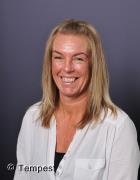

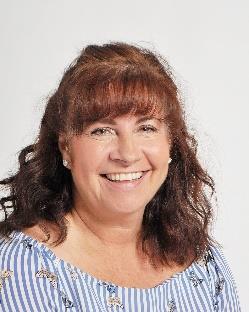
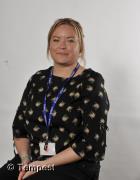
Emma Jones
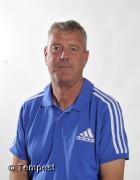
TA and Cwtch Club facilitatorat Grange Road
Mrs Jones is a Trauma Informed Practitioner. She runs our Cwtch Club on a daily drop in basis, enabling pupils to off load any issues they are experiencing and sign posting them to relevant support.
Barney School BuddyDog
Barney is the most popular member of staff at Tir Morfa. He is timetabled to spend time with different classes and groups throughout the week and can be relied upon to bring a smile to everyone’s face (and hoover up any food spillages).
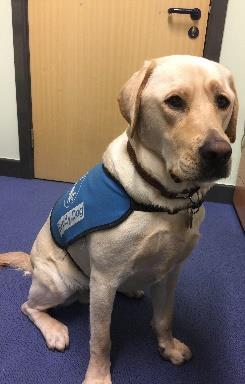
Page | 21 Mental Health and
Well
Rhona O’Neill
Headteacher and trained adult mental health first aider
Phil Thomas Deputy Headteacher and trained adult mental health first aider
Sue
Diane Hill
Equal Opportunities
The governing body and school are committed to a policy of equality and aims to ensure that no employee, job applicant, pupil or other member of the school community is treated less favourably on grounds of sex, race, colour, ethnic or national origin, marital status, age, sexual orientation, disability or religious belief. Any behaviour, comments or attitudes that undermine or threaten an individual’s self esteem on these grounds will not be tolerated. We aim to provide equal access to high quality educational opportunities and to ensure that everyone feels that they are a valued member of the school community. We seek to provide a safe and happy environment where all can flourish and where cultural diversity is celebrated. We aim to empower our pupils to make informed choices so that they are better prepared for the opportunities, responsibilities and experiences of life within their community. Equality of opportunity cannot be realised without the involvement and commitment of all members of the school community and a common understanding of the pivotal role of equal opportunities in the context of the school’s ethos and values, in particular, the recognition that the role of all staff is crucial in the delivery of the objectives of the policy.
Health and Safety
The school has a comprehensive Health and Safety Policy which endeavours to provide a safe and secure environment for all. The three school buildings have secure entry systems. All visitors to school are requested to sign in and out when they arrive or leave the building to enable an accurate roll call in case of fire. All staff are encouraged to “challenge” any unfamiliar persons. The school perimeter and playgrounds are fully fenced and gated. The Governing Body has a Health and Safety sub committee who meet regularly. Procedures relating to the health, safety and welfare of pupils and staff are regularly reviewed. Staff receive regular training in a range of health and safety procedures.
Further risk assessments are carried out as appropriate for specific issues where an element of risk may be involved such as manual handling, school trips, science, technology, P.E., vocational areas, transport and site access, residential provision etc. The school grounds are checked regularly by the site manager and any defects or hazards reported to the Headteacher. Any maintenance or repairs identified through this process will be completed at the earliest possible time, subject to funding.
Drills are conducted at varying times with no warnings given to ensure proper procedures are followed by all staff and pupils. The time taken to evacuate the building and any delays or difficulties exiting are duly noted and rectified. No smoking is permitted at any time not only in the school building but also in the school grounds and we politely ask all parents and carers bringing and collecting pupils to and from school to comply with our wishes. Some staff have undertaken basic first aid training and resuscitation. All accidents are documented appropriately.
Pupils will not be allowed out of school with anyone other than the taxi/escort who regularly collects them unless staff members are informed of the changes to normal routines.
School Transport and Access
Transport to and from school is provided by the Local Authority for some pupils, subject to agreed criteria. Application forms are available on request. It is important to remember that pupils using this service are required to conduct themselves in a proper manner at all times to ensure their own safety and that of others.
Pupils must stay with their transport until the doors open. At the end of the school day pupils are escorted to their transport by members of staff.
Access by car is via the school drive. Please drive considerately when approaching the school. Pedestrian access suitable for prams etc. can be found alongside the school drive. The main entrance at Ysgol Tir Morfa is fully accessible for those with physical and mobility difficulties. Please respect the DISABLED and KEEP CLEAR markings in the car park at all times
Page | 22

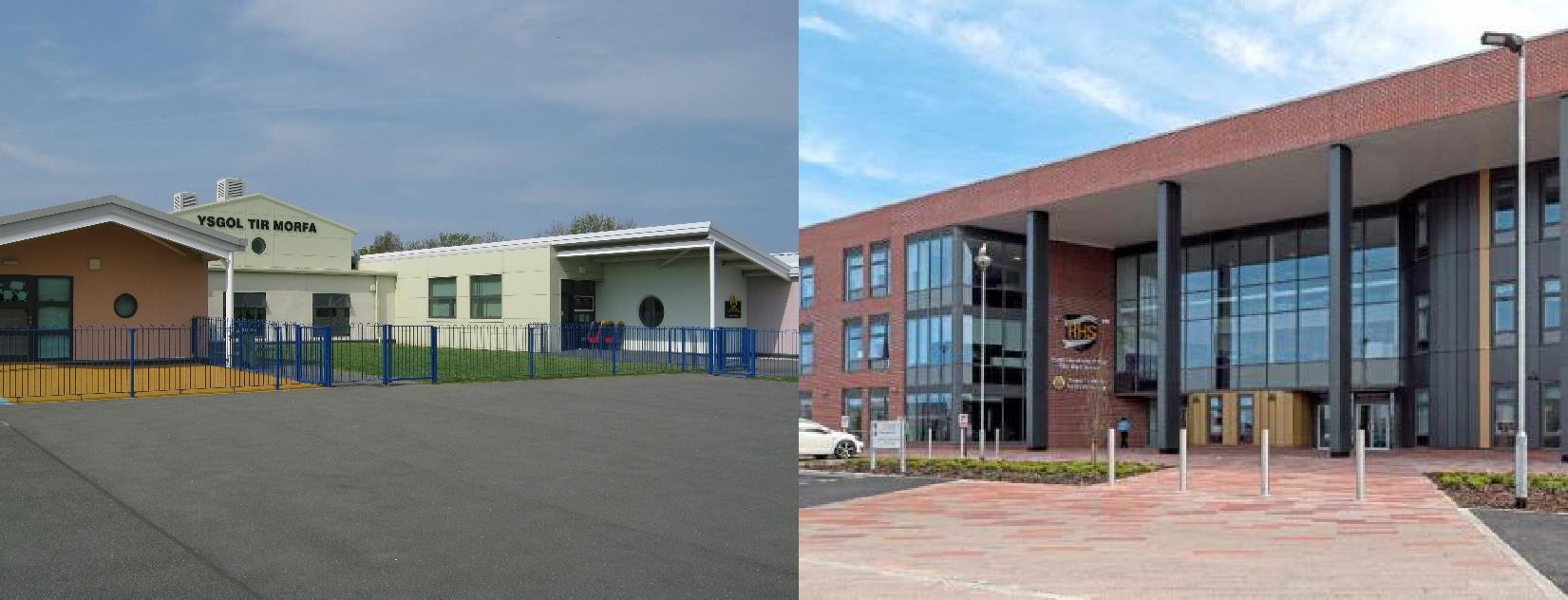
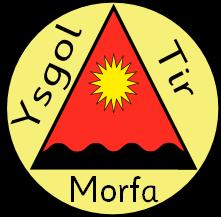

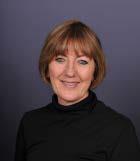
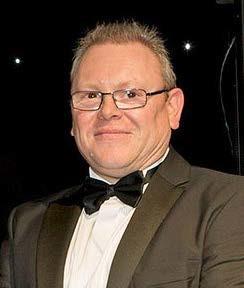 Mr Ben Caley, Chair of Governors
Mr Ben Caley, Chair of Governors
